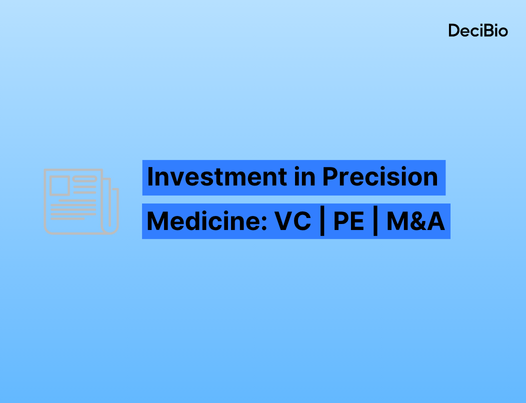Highlights & Summary
We have just started 2025 and there have already been some significant updates. Namely, the FDA published two draft guidances, one aimed at medical devices and one at using AI in drug discovery and development (a first). We will see how these guidances change and update with the new administration taking over. Across drug development, diagnostics, and the broader healthcare ecosystem there have been several partnerships forged.
Happy reading!
AI in Drug Discovery
1 | LinkedIn co-founder Reid Hoffman launches Manas AI, an AI-first startup to speed up drug discovery in oncology | Company Creation
2 | FDA Proposes First Comprehensive Framework for AI in Drug Development | Regulatory
3 | Novo Nordisk Expands AI-Driven Drug Discovery Partnership with Valo Health | Partnership
AI in Diagnostics
1 | Quibim Announces $50M Series A for AI-Driven Imaging Biomarker Detection | Financing
2 | Tempus AI and Genialis Partner to Advance RNA-Based Cancer Diagnostics and Treatment Algorithms | Partnership
3 | Lumea and Mindpeak Form Strategic Alliance to Advance AI in Digital Pathology | Partnership
AI in Healthcare
1 | Hippocratic AI Closes $141M Series B Led by Kleiner Perkins | Financing
2 | FDA Issues Draft Guidance for Transparency and Safety of AI-Enabled Medical Devices | Regulatory
3 | Mayo Clinic Partners with Microsoft and Cerebras to Develop Advanced AI Foundation Models | Partnership
AI in Drug Discovery
1 | LinkedIn co-founder Reid Hoffman launches Manas AI, an AI-first startup to speed up drug discovery in oncology | Company Creation
Tech investor Reid Hoffman and oncologist Dr. Siddhartha Mukherjee have founded Manas AI, a startup aimed at using artificial intelligence to speed up drug discovery, particularly for aggressive cancers. The company has raised $24.6 million in seed funding and plans to leverage AI and proprietary chemical libraries to potentially reduce the traditional decade-long drug development process to just a few years. Manas has established a partnership with Microsoft and currently operates with a small team of four employees, focusing on merging scientific expertise with artificial intelligence.
2 | FDA Proposes First Comprehensive Framework for AI Specifically Used in Drug Development | Regulatory
The U.S. Food and Drug Administration (FDA) has issued draft guidance for using artificial intelligence in drug and biological product development, marking its first comprehensive framework in this area. The guidance focuses on establishing model credibility and provides a risk-based approach for assessing AI's role in regulatory submissions. The FDA was drawing from its experience with over 500 AI-component submissions since 2016 and is currently seeking public feedback on the draft guidance. With the new administration taking over significant changes and updates are expected in how FDA approaches AI regulation.
3 | Novo Nordisk Expands AI-Driven Drug Discovery Partnership with Valo Health | Partnership
Novo Nordisk and Valo Health have expanded their collaboration to discover and develop up to 20 drug programs targeting obesity, type 2 diabetes, and cardiovascular diseases. The agreement includes near-term payments of 190 million dollars, with Valo potentially receiving up to 4.6 billion dollars in milestone payments. The partnership leverages Valo's AI-powered Opal Computational Platform and Novo Nordisk's expertise in cardiometabolic diseases.
AI in Diagnostics
1 | Quibim Announces $50M Series A for AI-Driven Imaging Biomarker Detection | Financing
Quibim, a health tech company revolutionizing imaging biomarkers for precision medicine- backed diagnoses, recently raised a $50M Series A backed by Asabys and Buenavista Equity Partners. Quibim develops foundational AI models to analyze MRI, CT, and PET scans to enable precision characterization of notable phenotypes / markers for oncology, immunology, neurology, and metabolic disorders. Quibim announced a global partnership with Philips in 2024 to integrate AI models into MR scanners, and has alliances with Merck KGaA and Novartis, in addition to prestigious clinical partnerships (e.g., Mass General Brigham and Stanford). Their current portfolio consists of tools for prostate, brain, and liver disease detection.
2 | Tempus AI and Genialis Partner to Advance RNA-Based Cancer Diagnostics and Treatment Algorithms | Partnership
Tempus AI and Genialis have entered a multi-year collaboration to develop RNA-based biomarker algorithms for cancer treatment. Genialis will use Tempus' multimodal dataset to validate its AI foundation model, which aims to improve patient response prediction and diagnostic accuracy. The partnership allows Genialis to leverage Tempus' Lens analytics platform, while Tempus gains potential licensing rights to Genialis-developed algorithms.
3 | Lumea and Mindpeak Form Strategic Alliance to Advance AI in Digital Pathology | Partnership
Lumea Inc. has partnered with Mindpeak GmbH to integrate advanced AI diagnostic tools into its digital pathology platform. The collaboration will bring Mindpeak's AI solutions, including Breast Suite, PD-L1 analysis, and Gleason grading tools for prostate cancer, into Lumea's BxLink platform. This partnership aims to enhance tumor grading precision and improve clinical decision-making by combining efficient tissue processing, advanced image management, and intelligent AI analytics. The integration will provide pathologists with more sophisticated tools for cancer detection, quantification, and classification, supporting laboratories, pharmaceutical companies, and biotech innovators in their digital transformation efforts.
AI in Healthcare
1 | Hippocratic AI Closes $141M Series B Led by Kleiner Perkins | Financing
Hippocratic AI pioneered the first use of a Large Language Model (LLM) for patient-facing non-diagnostic clinical tasks, which aims to broaden healthcare accessibility and improve outcomes by promoting healthcare comprehension. Hippocratic AI welcomed additional capital in their recent Series B, which was led by Kleiner Perkins, to expand verticals (e.g., into pharma and payors) and markets (e.g., EMEA, Southeast Asia, LATAM). The company maintains partnerships with various health systems, such as UHS, Honor Health, WellSpan Health, etc., which helped facilitate launch of its Polaris 2.0 product: a next generation system for safety-focused patient-facing healthcare conversations.
2 | FDA Issues Draft Guidance for Transparency and Safety of AI-Enabled Medical Devices | Regulatory
In yet another AI focused update the FDA released draft guidance for AI-enabled medical devices, addressing design, development, and maintenance considerations. The guidance focuses on transparency, bias mitigation, and postmarket monitoring. The FDA has authorized over 1,000 AI-enabled devices and is seeking public comments until April 7. The document recommends that manufacturers provide detailed information about AI models, including datasets and update processes.
3 | Mayo Clinic Partners with Microsoft and Cerebras to Develop Advanced AI Foundation Models | Partnership
Mayo Clinic has launched collaborative projects with Microsoft Research and Cerebras Systems to develop cutting-edge AI foundation models for medical research. In partnership with Microsoft, the clinic is creating an AI model for radiology that can generate reports and evaluate chest X-ray images. The collaboration with Cerebras focuses on a genomic foundation model that combines public human genome data with Mayo Clinic's patient exome data. These models can process complex medical information across multiple domains, potentially transforming how researchers analyze medical data and approach personalized treatment strategies. The projects aim to leverage large-scale datasets and advanced computing capabilities to create more versatile and powerful AI tools for medical science.

.png)








.png)

.png)

